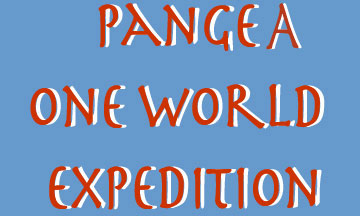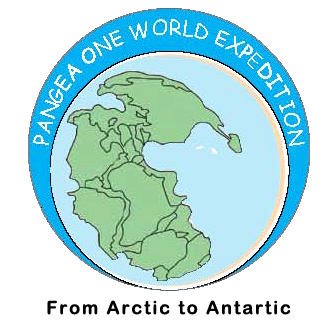
EXPEDITION ACCOUNTS
US WEST COAST
In spite of all the delays and the fog, our ferry docked in Bellingham, Washington State, an hour earlier than scheduled. Terence Finan, my friend and dorm-mate from University of Washington, Seattle, picked us up and took us, on my request, on the 32km Chuckanut Drive - said to be one of the most spectacular drives in the world - if you can see the view. The dense fog had totally erased the picture. We didn't see a curve of the snaking, cliff-hugging road; didn't see a needle of the beautiful pine trees, or a square inch of the blue waters of Puget Sound and its forest-clad islands. We didn't see a thing but ourselves.
Seattle, hemmed between the Olympic and Cascades mountains, their peaks helmeted with glittering snow, and its expanse of lakes and sounds, has always been the most liveable city in America and is likely to remain so even if the climate change predictions come true. According to ----- temperatures in the west of Cascades will only rise by 1.7 degrees Celsius by 2080 while in the east they will go up by 2.2 degrees - making Seattle the choicest place to live. Nancy Ritzenthaler of Climate Solutions, an organisation influencing public policy on environment, took us to watch the women's pro basketball match between Seattle Storm and Tulsa Oklahoma and pointed out the increasing number of Chinese and Latinos who made up the audience. "Migration to Washington State and Seattle has gone up significantly over the years and climate change related migration is bound to increase in the future as other places get warmer," she observed.
Boarding the Coast Starlight we rolled along the rippling waters of misty Puget Sound, through never-ending evergreen forests, past busy lumber mills stacked with mountains of logs. Quaint villages with picturesque farmhouses constantly framed our train's window as we rushed through Oregon towards California. An Indian ship, Prabhu Sumat, was seen docked in a scrapyard.
Talk between passengers in the Parlour Car was dominated by the on-going flooding in Colorado. Half year's worth of rain has fallen in three days. Four persons have died and a thousand are missing. Some called it "biblical". Others relate it to climate change. This summer Colorado was drought-affected and had its worst and most destructive wildfire - followed by flash floods. Another dismissed it as just a freak incident that had nothing to do with either religion or climate change. There was one in a thousand chance of a downpour such as this happening in a year - and it happened.
Reports of two tropical storms - Ingrid and Manuel - hitting our route through Mexico have caused us some concern. Landslides have cut off highways. Twelve passengers died when a landslide swept away a bus. A total of 33 deaths and several accidents on rain-slickened roads are reported. Oaxaca region, where we are scheduled to be on September 26, is also affected.
We met, on the train, Jeff Chandler who had served in India as a peace corps volunteer from 1964-66 teaching Santhali tribal students in Ramakrishna Mission Vidyapeeth in Deogarh district of Bihar. He greatly enjoyed the time spent in the remote area - "till Indira Gandhi threw us out. We were CIA - or so she thought," saidJeff, restraining his laughter.The "spy" spent his entire life teaching high school kids in Richmond, an oil refinery township across the bay from San Francisco.
Soon after Leaving San Jose station our train stopped and remained motionless for the next 45 minutes. It was announced that we would be returning to San Jose for crew replacement. The engineer/driver had jumped a signal and the entire crew, including the conductor, was being suspended. A fresh crew had to be brought in from Sacremento. The passengers showed rare patience and reckoned it was prudent to wait than risk the hazard of being in the hands of an irresponsible crew. Meanwhile, we cooled our heels for seven hours in San Jose. The sight of the substitutes did not provide any consolation. The engineer and the lady conductor seemed to have been pulled out of their graves. We missed our connection from Los Angeles to San Diego. Arriving in LA at 4.30 am, Amtrak bussed us to Our destination. The seven-hour-delay was a record for Coast Starlight and I hope it remains unbeaten till Amtrak retires from the market.
In the US it is the cities, rather than the federal or state governments, that are taking a lead on climate change action. California is in midst of a water crisis with reduced flows in the Colorado River, reduced snowmelts from Sierra Nevadas, and reduced availability in the Bay Delta - all attributed to climate change. San Diego, lying at the southern end of the emptying water pipeline, is particular vulnerable. The Water Policy Implementation Task Force, appointed by the San Diego City Council, has identified a set of actions the city should take to ensure a better water future. These include: a 20 percent water use reduction by 2020; use of native, drought-resistant plants to reduce landscape irrigation; older homes to be retrofitted with more efficient indoor water systems; gradually recycling one-third of the waste water into drinking water by 2035; optimising use of grey water from sinks and washers for on-site irrigation; and harvesting stormwater for replenishing groundwater basin.
We made long trip to the University of California, San Diego, to meet Dr. Mario Molina, professor of chemistry and biochemistry who was awarded the Nobel Prize in 1995 for identifying a class of common household chemicals that were damaging the earth's ozone layer. The Nobel laureate's door, in Urey Hall. was locked. We noticed the name plate of 'Amit Sinha' on a nearby door. We decided to disturb him instead. His door was locked too - but from the inside. Responding to our loud banging, he opened it and on enquiring about Professor Molina he said: "He is a very busy person. Must be out giving lectures or collecting awards." Molin was due to receive the Presidential Medal of Freedom, the highest US civilian award, at the White House.
For some reason the Indian connection is strong in San Diego. The Star of India, commissioned in 1863, the world's oldest active sailing ship and one of the first iron ships ever made, is docked in San Diego. And the borough of Little Italy dominates India Street.
Tomorrow we enter the lawless part of northern Mexico. US and European travel advisories plead with tourists not to venture into this region. No car rental company gives out its vehicles for this area. All travel agencies recommended flying. Mexican underworld has targeted bus passengers for mass killings. The drug cartel don, Death, arrested two months ago, would hijack buses, make passengers fight unto death - and recruit the sole survivor into his private army. We find the advisories gratifying.





